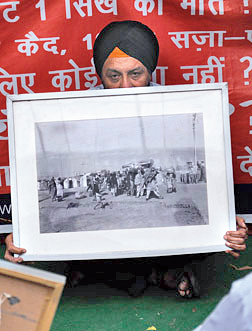South Asia continues to witness incidents of violence incited by religious, ethnic or sociopolitical issues. In the process, a category of survivors is created, who are forced to subsist with a traumatic past, making an effort to reconstruct the present and reconcile themselves with a permanent sense of insecurity. After 1947, ideally India should have nurtured a new space for communal harmony in order to overcome prejudices. There have been repeated disappointments and Black November: Writings on the Sikh Massacres of 1984 and the Aftermath, edited by Ishmeet Kaur Chaudhry, blatantly reveals the fact that the days of State-sponsored violence are not over. The carnage following the assassination of Indira Gandhi, then the prime minister, on October 31, 1984 is still alive in individual as well as collective memory. Such memory reflects an unholy combination of politics and religion fired by rumours and inaction on the part of the administration. The structure of the book looks interesting as it tries to bridge its four sections. The first section highlights interviews, personal narratives and certain relevant affidavits filed with the Nanavati Commission, supplemented by stories, plays and poems in sections two, three and four. The narrative traces how cruelty and intolerance collaborated to provoke mob fury, manipulated by leaders eager to mastermind a political vendetta through muscle power. The perpetrators rejoiced while the victims were brutally marginalized and persecuted.
Going through the non-fictional part of this book, one can experience the legacy of humiliation carried by the unfortunate community, which had lost relatives, its hard earned assets, its homes and, above all, its sense of honour. The affidavits of such eminent personalities like Khushwant Singh or the interview of the former prime minister, Manmohan Singh, and his wife, Gursharan Kaur, taken by Daman Singh, act as a benchmark vis-à-vis the experience of ordinary Sikh residents. The interview of Phanda Singh by Uma Chakravarti or the experience of Jarnail Singh discloses a planned design of violence and official apathy during the three days of unprecedented frenzy following Indira Gandhi’s killing. Women, as always, remain the chief mourners, either as observers of systematic extermination of their menfolk or as victims of violation and abuse.
The fictional part of this text reflects how the creative field of literature was intensely involved with the harrowing incidents of 1984. This in turn can be linked with Partition literature in its depths of tragedy, and in its course its ability to shatter the comfort zone of everyday existence. The short stories by Parvinder Mehta or Jyoti Verma, the play, Seekh Kabab, by Kuljeet Singh or a poem like “Duryodhan Still Rules Hastinapur” by Gurcharan Rampuri, among others, depict the vulnerability of a community exposed once more to communal hatred. Their plight did not end in 1947. The excerpt from Satya Vyas’s novel, Chaurasi, although not really a short story, carries an intense and powerful description showing how wrong the entire situation was.
Kaur Chaudhry’s compilation effectively represents the format of this riot and highlights how justice has been deliberately delayed and denied to the victims. The importance of literature in reconstructing the events of November 1984 has been given due cognizance, opening an avenue for interrogation, investigation and introspection.
Black November: Writings on the Sikh Massacres of 1984 and the Aftermath, edited by Ishmeet Kaur Chaudhry, Speaking Tiger, Rs 499










